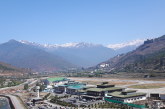Successful adaptation to a changing climate needs sensible strategies that guide and learn from actions. Climate change in some situations demands new strategies – for example for dealing with uncertainties and change – but must also draw on experiences and insights from past strategies in development. For Asia-Pacific countries to survive and thrive in a changing climate, greater efforts are needed to mainstream climate change adaptation into national development policies, moving away from business as usual practices.
In order to salvage the vulnerable regions from the adverse impact of climate change, some regional forums have been created and the Asia-Pacific Climate Change Forum has been established to address the climate change adaptation related issues of the countries of Asia-Pacific region. The first Forum was held in the first week of June 2010 followed by the second Forum held in the last week of January 2012.

Third APCCAF
The 3rd Asia-Pacific Climate Change Adaptation Forum (APCCAF) was held from 18th – 20th March 2013 in Incheon, Republic of Korea. The main theme of the forum was on “Mainstreaming Adaptation into Development” with a focus on key selected topics. The Forum was hosted by the Korea Environment Institute (KEI) in association with the Korea Adaptation Center for Climate Change (KACCC). The co-organisers were the United Nations Environment Programme (UNEP), the Institute for Global Environment Strategies (IGES), the Regional Resource Centre for Asia and the Pacific (RRC.AP), and the Stockholm Environment Institute (SEI).
This Forum was expected to assist decision-makers at all levels of government, in business and communities be more strategic and effective in addressing the challenges of development in a changing climate.
The forum afforded ample opportunities for a range of actors working in different sectors and systems to share their knowledge about successes, and failures, to effectively adapt to climate. The needs and interests of critical and neglected groups were highlighted alongside the need for improving knowledge management.
The Forum brought together 500 climate change adaptation experts and practitioners from across 30 Asia-Pacific countries in government, civil society, academia and the private sector to once again share experiences and find concrete solutions to mainstreaming adaptation planning at the national and community levels. The running theme of mainstreaming climate change adaptation has been the key issue Forum participants have been focusing on and addressing in the past three years.

The participants at the 3rd Forum examined more closely the increasing challenges faced by many countries in planning and implementing climate change adaptation. They include the lack of access to finance and technologies, as well as inadequate institutional capacity that resonates in most developing nations. About 150 speakers were engaged in six plenary and 26 parallel sessions at the Forum for three days (18 to 20 March 2013) to define these actions and find ways to bolster their adaptive capacities, including by better engaging the private sector and gaining access to global climate change adaptation funding.
The selected findings in the interim are listed below:
- The value of starting with existing policies and learning from experience are now more widely accepted. For example, how local communities have historically adapted to flood regimes is being reconsidered in contemporary landscapes.
- Adaptation strategies need to acknowledge more explicitly that vulnerabilities are dynamic and that multiple uncertainties remain.
- Governance structures need to be more inclusive and adaptive. This will help societies better navigate unprecedented and uncertain climates.
- The private sector is an important group to successful adaptation action. Conversations with business will have to take place in business events and boardrooms.
- Poor, vulnerable and critical neglected groups need to be engaged more directly and meaningfully in adaptation conversations.
- International organisations have an important role in sharing knowledge and experiences across countries. Adaptation knowledge management that is effective increases rates of learning and builds capacity.
Loss and damage is an issue for all countries considering the recent impacts of extreme weather events like floods and droughts.



